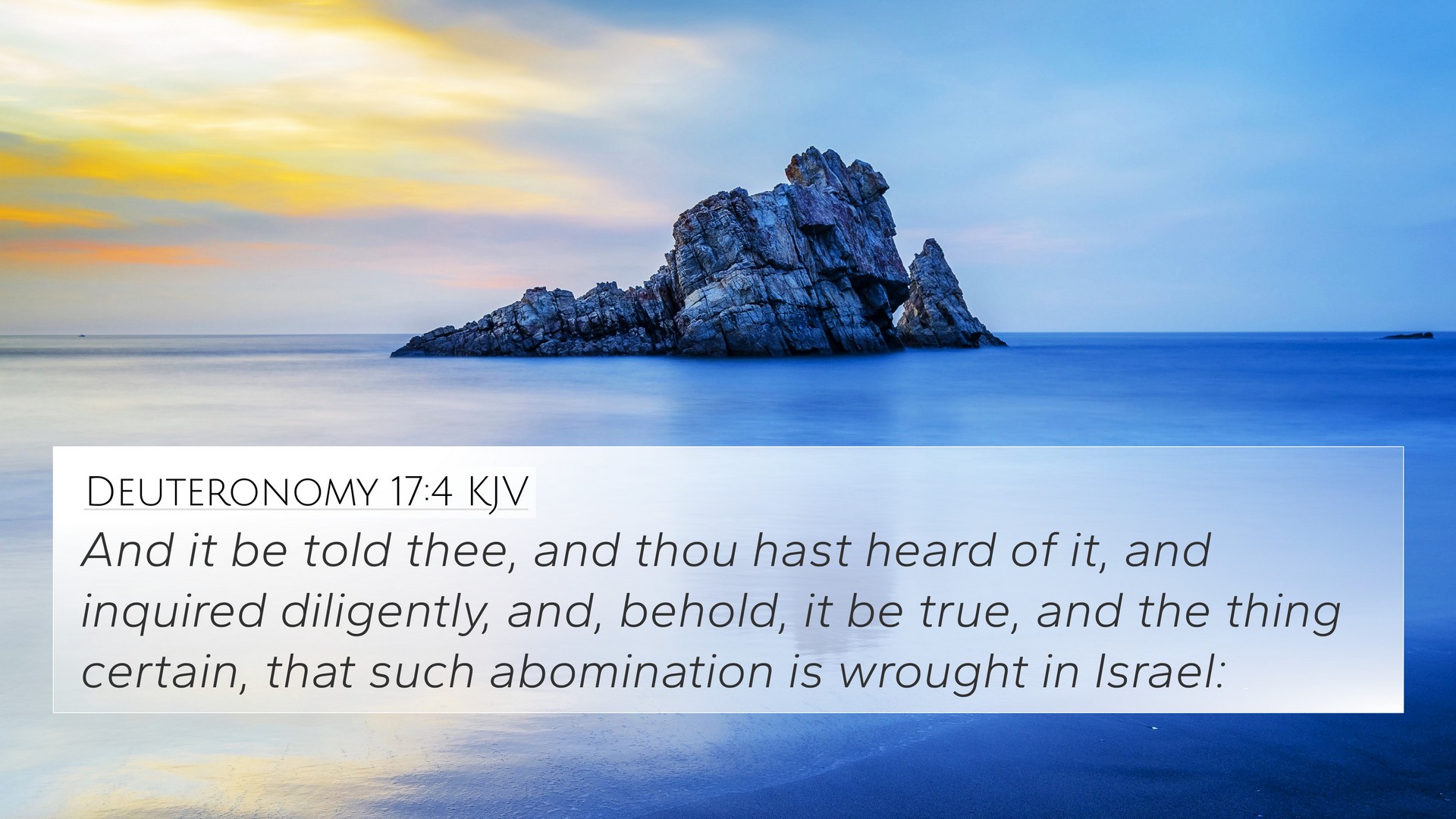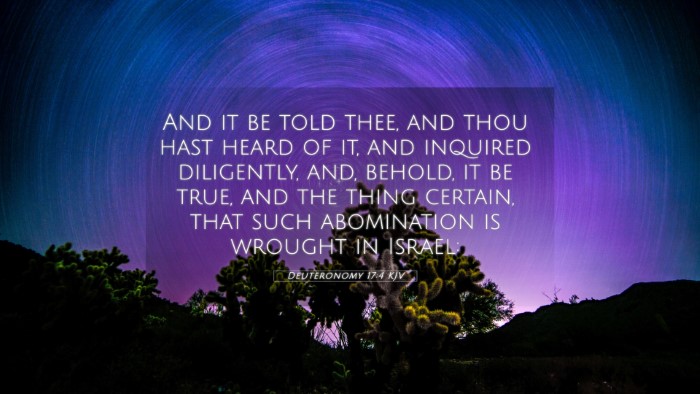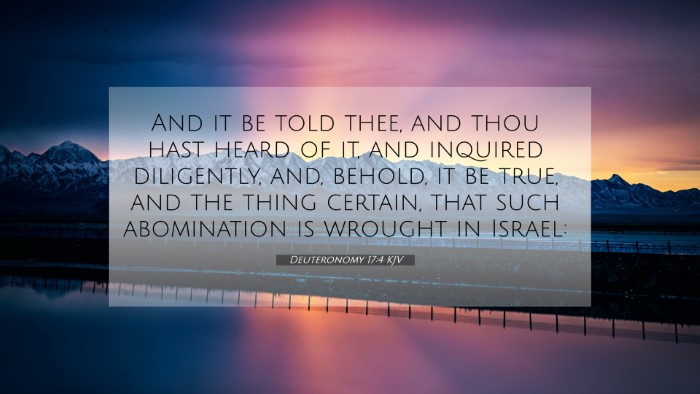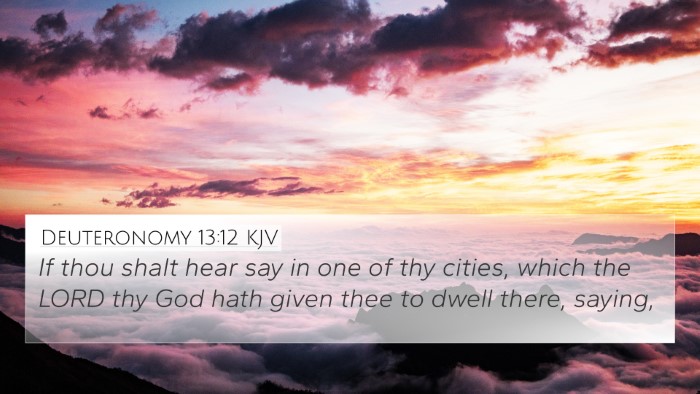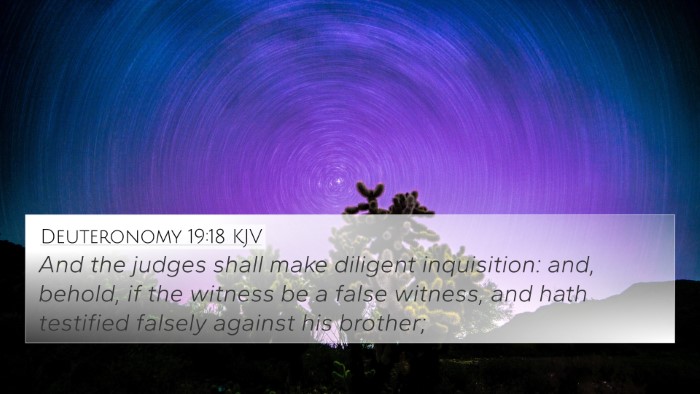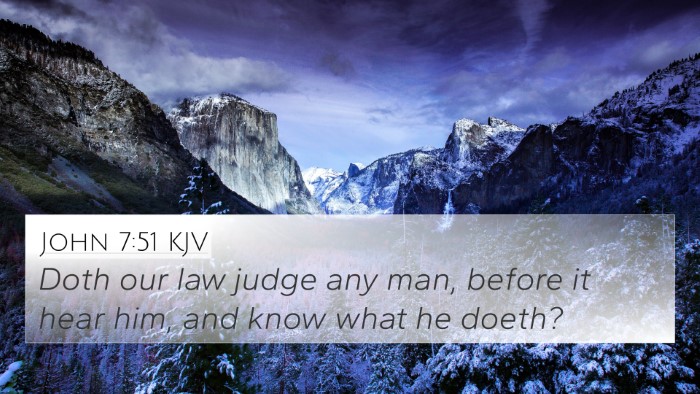Understanding Deuteronomy 17:4
Deuteronomy 17:4 states: "And it be told thee, and thou hast heard of it, and enquired diligently, and behold, it be true, and the thing certain, that such abomination is wrought in Israel:" This verse establishes protocols for dealing with idol worship among the Israelites. It emphasizes the importance of thorough investigation when accusations arise regarding idolatry, urging the community to be diligent in their inquiries. The primary aim is to ensure justice and purity among God’s chosen people.
Commentaries Summary
Insights from Matthew Henry
Matthew Henry’s commentary highlights the necessity of careful examination and commonsense when addressing matters of faith and conduct. He suggests that the seriousness of idolatry requires not only a response but also a deep engagement with the truth. Henry emphasizes that mere hearsay should not lead to hasty actions, and only after a thorough investigation should appropriate steps be taken.
Insights from Albert Barnes
Albert Barnes elaborates on the implications of this verse, noting that it serves as a protective measure for the integrity of the Israelite community. He interprets the prescribed diligence in inquiry as a safeguard against false accusations and the mishandling of serious issues. Barnes asserts that this verse poses a moral obligation on the community to uphold justice and righteousness.
Insights from Adam Clarke
Adam Clarke's commentary emphasizes the consequences of idolatry and the theological underpinnings relevant to this instruction. He comments on the severe nature of idolatrous practices and the need for a communal response to such issues to maintain a covenant relationship with God. Clarke calls for the community's active participation in discerning and confronting sin.
Bible Cross-References
This verse connects with several other scriptures that enrich its meaning and provide further context:
- Exodus 20:3-5: The commandment outlines the prohibition against idolatry, underscoring the significance of this theme throughout the Torah.
- Leviticus 20:2: Here, the seriousness of worshiping false gods and the penalty that follows is emphasized, linking back to the societal implications highlighted in Deuteronomy 17:4.
- Deuteronomy 13:12-15: This passage explicitly details procedures for confronting idolatry in the community, echoing the principles of verification and diligence found in Deuteronomy 17:4.
- 1 John 4:1: The New Testament also stresses the importance of testing spirits and verifying claims, paralleling the call for discernment from Deuteronomy.
- Matthew 18:15: Jesus outlines a method for resolving disputes within the church, reinforcing the need for thorough investigation before declaring actions against a brother.
- Acts 17:11: The Bereans are praised for examining the Scriptures to confirm the truth of Paul’s teachings, reflecting a similar diligence required by individuals.
- Romans 12:9: Paul instructs believers to actively oppose evil, illustrating the necessity for commitment to truth which is parallel to the inquiry prescribed in Deuteronomy.
Connections Between Bible Verses
The thematic connections between these verses form a mosaic of how God’s people are to live in fidelity to their covenant. The emphasis on diligent inquiry and the communal approach to addressing sin tie into a broader narrative of justice and holiness in the Scriptures.
Tools for Bible Cross-Referencing
Utilizing tools like a bible concordance or a bible cross-reference guide can aid in discovering deeper links among scriptures. Such references allow for a comprehensive bible cross-reference study that can elucidate the interconnectedness of various biblical texts.
Conclusion
Deuteronomy 17:4 serves as a pivotal reminder to maintain integrity within the community of believers and the seriousness with which idolatry is regarded. As we consider the connections between different scriptures and the application of their truths in our lives, we are reminded of our collective responsibility to uphold the tenets of our faith through diligent inquiry and communal accountability.
